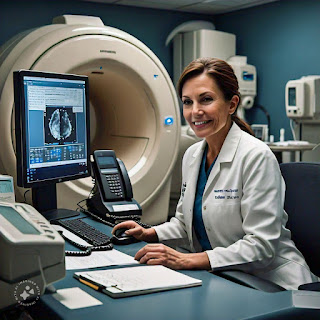Unlocking the Power of MRI Scans in Chandigarh : Enhancing Diagnosis and Treatment"
Introduction
Magnetic Resonance Imaging (MRI) has revolutionized the field of medical diagnostics. Using strong magnets and radio waves, MRI provides detailed images of internal structures, offering invaluable insights for diagnosis and treatment. Here’s a closer look at why MRI scans are a powerful tool in modern medicine.
What is an MRI Scan?
An MRI scan is a non-invasive imaging technique that uses powerful magnets, radio waves, and a computer to create detailed images of organs and tissues inside the body. Unlike X-rays and CT scans, MRI does not use ionizing radiation, making it a safer option for repeated imaging.
Why MRI is Essential for Accurate Diagnosis
- Detailed Imaging: MRI provides high-resolution images, allowing doctors to see fine details of tissues and organs. This is crucial for diagnosing conditions such as tumors, brain disorders, and joint injuries.
- Soft Tissue Contrast: MRI is particularly effective at imaging soft tissues, such as the brain, muscles, and spinal cord. This contrasts with X-rays, which are better suited for bone imaging.
- Early Detection: Early detection of diseases, such as cancers and neurological conditions, is often possible with MRI, leading to better treatment outcomes.
Common Uses of MRI Scans
- Neurological Assessments: MRI is used to diagnose and monitor brain and spinal cord conditions, including tumors, strokes, and degenerative diseases.
- Orthopedic Evaluations: For assessing joint injuries, ligament tears, and spinal issues, MRI provides detailed images that help guide treatment plans.
- Cardiac Imaging: MRI is used to evaluate heart conditions, including congenital heart defects and myocardial diseases.
Benefits of MRI Scans
- Non-Invasive: MRI scans do not require surgery or insertion of instruments into the body, reducing the risk of complications.
- No Radiation: Unlike X-rays and CT scans, MRI does not expose patients to ionizing radiation, making it safer for frequent imaging.
- High Sensitivity: MRI’s ability to differentiate between various types of tissues helps in accurate diagnosis and treatment planning.
Preparation and Procedure
Preparing for an MRI scan generally involves removing all metal objects and clothing. Patients may be asked to wear a hospital gown. During the scan, patients lie still on a table that moves into the MRI machine, which makes loud noises. The procedure is typically painless, though some patients may experience discomfort from lying still.
Conclusion
MRI scans are a cornerstone of modern diagnostic medicine, offering unmatched detail and clarity in imaging. By providing accurate and comprehensive information, MRI helps in the effective diagnosis and treatment of a wide range of medical conditions. If you’re scheduled for an MRI, rest assured you’re receiving one of the best tools available for understanding and addressing your health concerns.





Comments
Post a Comment